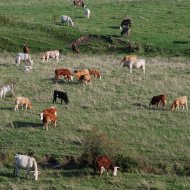
Sets a minimum standard for farms
UK supermarket Waitrose has pledged to give its dairy cows a minimum of 100 days of outdoor grazing a year.
The retalier says that they are already one of the only supermarkets to give their dairy cows access to pasture during the grazing season in the summer months.
But this new pledge sets a minimum standard for farms, strengthening the retailer’s ‘commitment to animal welfare and ensuring a level of consistency across its dairy farms.’
“We’ve always required our farmers to graze their dairy herds outside but this move puts in place a minimum benchmark of at least 100 days a year,” commented Heather Jenkins, Waitrose director of agriculture and meat. “We’re proud of our commitment and proud of our dairy farmers for the support they have given us with this move to a formal standard.
“Getting dairy cows outside and on grass pasture whenever possible not only produces great quality milk but is a key aspect of good animal welfare, something we believe is of the utmost importance.”
Waitrose already has a strong record in animal welfare. The retailer was recently crowned Tier One leader on the global Business Benchmark on Farm Animal Welfare for the second year running.
The store also won Compassion in World Farming’s Good Dairy Award in 2011 and the CiWF Retailer of the year for the sixth time in 2015.
Philip Lymbery, Compassion’s chief executive, said: “As the only major retailer who ensures that all their cows are allowed seasonal grazing, I have nothing but praise for Waitrose on their milk commitment.
“Waitrose remains one of the leaders in the proverbial herd, when it comes to their liquid milk. I think that most consumers presume that all dairy cows are allowed out on pasture. Sadly, this simply isn’t the case. In terms of dairy cow welfare, Waitrose delivers what its customers expect and what the cows need to live a happier, healthier life.”
Brian Barnett, chair of the Waitrose Dairy Farmers Group, added: “As farmers supplying milk to Waitrose we have always been required to graze their dairy cattle, so having pasture land and suitable buildings to make this possible is embedded in our on-farm planning.
"Now, with Waitrose, we have agreed a minimum standard to demonstrate our shared commitment to ensuring that our dairy cows are able to enjoy outside pasture for at least 100 days a year.
“The Waitrose milk producer group has been working closely with Waitrose for many years and over this time we have developed a producer scheme which reflects the Waitrose values and those of the Waitrose customer. Grazing cattle has always been important to us and we are pleased to be able to embed this requirement as a benchmark for our milk supply group."



 The veterinary mental health charity Vetlife is inviting the veterinary community to join it for a sponsored cold-water dip.
The veterinary mental health charity Vetlife is inviting the veterinary community to join it for a sponsored cold-water dip.